Dear Dad,
Happy Birthday. I wish I could be there to wish you a great one, as I did last year when you turned 90 and the whole family gathered to celebrate.
This year I can't make it. Sadly, I am a prisoner of Thailand. My passport has been seized because I am being accused by the Royal Thai Navy of criminal defamation. I face possibly a long jail term.
The contentious paragraph we published on the Phuketwan news site in July last year was written by two Reuters news agency reporters who won a prestigious Pulitzer award for it and other paragraphs in an excellent series on the Rohingya boatpeople.
Strangely enough, the Royal Thai Navy is suing Phuketwan and not the Reuters authors, probably because we are a very small organisation and Reuters is a large one.
So I have surrendered my Australian passport. An application to have it returned so I could be there for your birthday was rejected. If the case drags on, as seems likely, I could be a prisoner of Thailand for the next few years, with the prospect of jail still to come.
I miss you, and I miss all the family.
I am telling you this in a letter, Dad, because I know your hearing is failing. I also know that my sisters have kept secret from you the fact that I am a prisoner of Thailand. They fear that the news would kill you.
If I'd been there today, I probably would have told you all about it, as gently as possible. So instead, I must write to let you know what a great father you've been all these many years, and that your sacrifices will never be forgotten.
You were one of those worker Dads my four sisters and I saw less often than we would have liked, from a generation where fathers worked and mothers did not, at least not in regular jobs.
You went to war, just like your father did and Mum's father did. Both of them clambered ashore at Gallipoli. One of them was wounded and sent home. The other went on to the Western front where he was gassed in the trenches. He survived, but the gas cut his life short.
Why did Australia go to two world wars? There are times when injustice simply must be confronted, I guess.
My brave Thai colleague, Chutima Sidasathian, who is also being sued by the Royal Thai Navy, has been confronting the unjust treatment of Burma's Rohingya boatpeople in Thailand for years now.
The two of us aim to continue doing that. We've told the Royal Thai Navy that if they want to stop us reporting on what's happening to the boatpeople, they will have to kill us.
We hope the Navy sees sense and instead of using Draconian laws against a small media organisation, turns their attention to the human traffickers, or to the Burmese Government driving the Rohingya into the sea. Sadly, that seems unlikely to happen soon.
I became more hopeful recently when the British government won back the passport of a human rights defender named Andy Hall, simply by asking the Thai courts. Andy has since travelled to Britain and to Burma and could spend Christmas at home with his folks.
For reasons they decline to explain, the Australian Government continues to reject my pleas to do the same in my case, even though officially, my passport is their property.
We've enjoyed enormous support from many sources. The United Nations human rights body, the European Union nations, Human Rights Watch, Reporters Without Borders, the Committee to Protect Journalists, the International Commission of Jurists and many other organisations have spoke up in our defence.
The Australian Government, though, has said nothing.
Over the years, Dad, there were many times when you showed how much you cared. The time I remember most is back in the '60s, when I was conscripted to join the Australian Army.
I was young and not in favor of the Vietnam War, but being a journalist I wanted to go to see for myself what was happening in Asia. I volunteered.
Without telling me, you wrote many letters to the Minister for the Army, mostly pointing out that too many conscripts were being killed by the enemy.
I remember as a gawky 20-something walking into the minister's office in Canberra. He sat me down in front of a huge desk.
You know the first words he said to me? ''Private Morison,'' he said, ''your father obviously loves you a lot.''
The Army Minister was right. Everything you've done for me and the family before and since has proven his judgement to be correct. Your values have become ingrained in all of us.
It took me many years to get to Asia. Now I'm there, fighting a different kind of fight for freedom of the media and for the Rohingya, a group the UN describes as the most persecuted people in the world.
The problem would be solved if Burma could be persuaded not to push them into the sea. The Royal Thai Navy and the Australian Government could do a lot to end their misery, not by turning back the boats but by preventing them from sailing.
I'm still left to wonder, though, if my country will ever be willing to fight for them, and for me.
It may be some time before I see you again.
Love to all,
Alan.
Alan Morison's sisters may decide it's not safe yet for John Morison to be told what's happening to his son. The trial of Alan Morison and Chutima Sidasathian for criminal defamation does not resume until July next year. If the case is lost, appeals are expected to take several more years.
The Australian Government
Former Ambassador to Thailand, James Wise: ''Normally, we take up issues like yours with our host government only after the person affected asks us to do so (especially when the case already has a high profile and we can be confident that the host government is aware of it). We would not want to cut across your own plans for managing the way you want to respond to the allegations against you - because, ultimately, how you manage your affairs is your business, not ours.''
United Nations
''Criminal prosecution for defamation has a chilling effect on freedom of the press,'' said Ravina Shamdasani, the spokesperson for the Office of the High Commissioner for Human Rights. ''International standards are clear that imprisonment is never an appropriate penalty for defamation.''
Human Rights Watch
''The Thai navy's lawsuit is a reckless attempt to curtail journalists' reporting on alleged human trafficking by its officers,'' said Brad Adams, Asia director at Human Rights Watch. ''Unless the government withdraws the case, its impact will be felt far beyond those reporting on abuses against the Rohingya - and could have a choking effect on all investigative reporting in Thailand.''
Reporters Without Borders
"It is intolerable that journalists are being prosecuted for just doing their job by relaying information of general interest that had already been made public," Reporters Without Borders said. "Bringing charges under the controversial Computers Crimes Act in a defamation case is indicative of the critical state of freedom of information in Thailand and amounts to an attempt to gag the media. We support these journalists, who are facing a jail term, and we call for the immediate withdrawal of these proceedings."
Committee to Protect Journalists
''Rather than shooting the messenger, the Royal Thai Navy would be better suited launching an internal investigation into the serious allegations of abuse that have been raised,'' said Shawn Crispin, CPJ's senior Southeast Asia representative. ''This type of legal intimidation aims ultimately at discouraging media reporting on allegations of serious human rights abuses.''
Chris Lewa, director of the rights group the Arakan Project
''Thanks to the fair investigative reporting by the Phuketwan journalists, the involvement of various Thai agencies in the massive smuggling and trafficking operations of Rohingya refugees and their related miseries is no more a secret. Rights groups should unite to call on Thailand to quash these defamation charges.''
Phuketwan
''We wish the Royal Thai Navy would clear its reputation by explaining precisely what is happening to the Rohingya in the Andaman Sea and in Thailand,'' Phuketwan said in a statement released in response to the charges. ''By instead using a controversial law against us, the Navy is, we believe, acting out of character.''
Bangkok Post
The action makes the navy look like a bully, and gives the impression the admirals would like to intimidate the media. Instead of defending the navy's honor, the criminal defamation suit holds it to question. Instead of silencing the media about the story - concerning the navy's role in the mistreatment of Rohingya boatpeople - the lawsuit repeats it, to more people and at greater length.
CNN
Morison said: "The navy's action over one paragraph has created a perfect storm. If the navy proceeds with the case, the Rohingya issue is now tied up in their action against media under a controversial law."
TIME
In the meantime, calmer seas mean that even more Rohingya are expected to attempt the treacherous journey in the weeks ahead. Nothing could gladden the traffickers more.
Reuters
Barb Burg, Reuters' (former) global head of communications: ''Our story was fair and balanced and Reuters has not been accused of criminal libel.''
Bill Barnett (The Phuket Insider)
The issues which have drawn Phuketwan into this fray are profound and disturbing. There should be no need to wax over reality and respect needs to be given to those who stand up for the helpless who cannot help themselves.
Andrew Drummond (Investigative Journalist)
We should all support journalists who are doing a difficult job here under laws which best suit a totalitarian state.
Excellence in Human Rights Reporting, Investigative Reporting awards
In 2010 the Phuketwan team shared the Society of Publishers in Asia Award for Excellence in Investigative Reporting and a second Award for Excellence in Human Rights Reporting, both with the South China Morning Post newspaper. Judges said of the Excellence in Investigative Reporting award: ''An excellent series that uncovered serious government abuses and had a material impact in correcting them. Exclusivity. Strong reporting. Hard-hitting piece with international implications.''
Of the Excellence in Human Rights Reporting award, the judges said: ''Excellent investigative work that exposed serious human rights abuses of oppressed people. Intrepid reporting of a hidden subject. This is a high-caliber series buttressed by solid on-the-ground reporting and great pictures. All militaries are challenging subjects for investigative reporters and Thailand's is no exception. The team clearly went to great lengths to get sources, break news, and provide the details that prodded the government into action.''

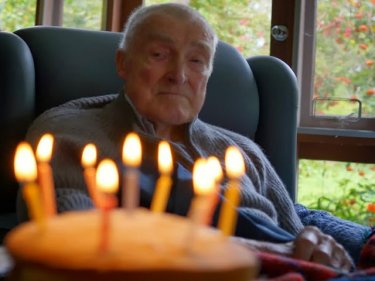





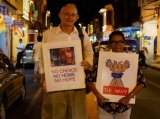
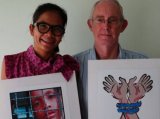
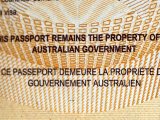


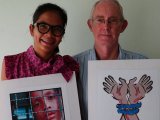
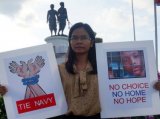
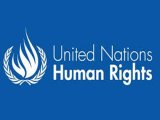

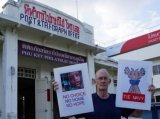


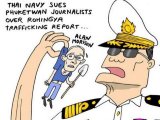




Is that a mini skirt in photo 2?
Posted by phonus on November 19, 2014 09:11
Editor Comment:
People were more coy back then. Frank Sinatra was the Miley Cyrus of the 1950s. Life was all about fine romance.